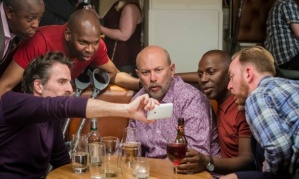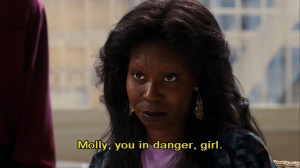*SPOILER ALERT*
Last night’s episode of Cucumber left many viewers in a state of shock when Lance Sullivan was brutally murdered by “straight” lust-interest, Daniel.
It was a hard scene to watch, but utterly breathtaking. It raised so many issues about the continual danger queer people face simply by existing. It reminded us all that we are, in many ways, more vulnerable than our straight counterparts. Most chilling of all, it reminded us that there are people in the world that think little enough of us to readily snuff us out when our interactions with them unsettle their identity.
It showed us that we are not liberated, not equal. Not safe. It takes a brave writer to confront their audience with such a harsh reality. And yet, as I watched Lance die, the anger I felt wasn’t a reaction solely to my vulnerability as a gay man.
What hit me the hardest wasn’t the fact that another queer character had been brutally murdered. In a queer-centered drama, seeing a gay man killed doesn’t represent the same, degrading power imbalance that you see in shows that focus on straight stories. What made this death sting differently was Lance’s race.
I wholeheartedly believe in Russel T Davis’ intention behind last night’s episode. I also agree that it’s an important story to tell, and that Cyril Nri was exceptional throughout (the series, not just this episode) . But here’s the thing: it could have never have happened to Henry. Because without Henry, there could be no show. So of course, Lance had to suffer. Being in close emotional proximity to Henry, whilst also being much less awful than him, made Lance the ideal candidate. Sure, we were invested in him – but Cucumber could continue without him.
So what’s the point? Why did Lance’s race make provoke such an intense reaction? Well, let me introduce you do a very common trope in storytelling:
The never-essential black character.

Cucumber has always struck me as a show that, considering the number of black characters shown so far, is very bad at centering queer black narratives. Lance, admittedly, was one of the best developed queer black characters I’ve ever seen on TV – fleshed out, likeable, complex and flawed – but he was never the center of the story. And it turns out, he was never meant to be. Russel T Davis confirmed this in an interview released shortly after the episode, seemingly unaware of the racial legacy he was feeding into:
By killing Lance, we leave Henry alone. That’s the real point. We’ve seen Henry lose everything. But now he’s really suffered a proper loss, and the series is an examination of that, of who Henry is, why he’s like he is, and whether he can change. This is his ultimate challenge. His safety net has gone. And he’s got a long way to fall.
There’s a long old history of black characters playing second fiddle white character development. The mystical negro, the helpful mammy, the kindly caretaker (see Ghost, The Greene Mile, Bruce Almighty) are well known and highly problematic tropes in the media. As an audience in a white supremacist world, the relationships we develop with black characters who act as development tools, are very rarely just about that character’s qualities. There’s also a comfort in the power-differential – the knowledge that a black character exists to develop a white character. It’s the dynamic on which the Western world is built. And people (sometimes regardless of race), find comfort in it because it reinforces the world as we know it. So yes, we love them. But removing them, no matter how brutally, doesn’t bring our world crashing down.

I remember watching straight-focused films and programmes where queer characters are killed, injured or humiliated as a device for the straight protagonist’s development. I remember it affecting me in a way that only the protagonist’s suffering should, because I identified with that queer character more than anyone else. I rooted for them and wanted them to succeed but ultimately knew that if a show didn’t center queer characters, queer characters won’t win. And it was the same with Lance. Watching him made me think about all the complexities of life as a queer man of colour in the UK. What it means to find love, be hurt, crave attention. All universal desires, but all nuanced by issues of race. So when he died, it resonated with me in a way that was also nuanced by issues of race. I had to ask myself: will I ever see someone who looks like me do well on television, in fiction. In real life?

Maybe it doesn’t seem that deep to some. But issues of representation rarely do when you’re represented everywhere, all the time. As I vented to Twitter, I got the odd “it’s only TV” response from followers. But like it or not, our ability to see and define ourselves is linked to what we have around us – and the media plays a huge role in that. And in the same way that seeing queer character live miserable lives in my youth made me wonder what my future will look like, I worry that until we start seeing queer characters of colour succeed on their own terms in the media, there will be little queer children of colour left wondering too.
How do we fix it? Really, providing positive queer character of colour in the media doesn’t work purely by ticking diversity tick boxes. Making the black character the boyfriend, or the teacher, or the doctor – no matter how brilliant those characters are – doesn’t stop them from being expendable. Here’s what we need to do.
A few followers challenged me do it. I just might*
*Of course, getting a show that actually focuses on the experiences of a queer character of colour commissioned is more difficult than it sounds. But that’s another conversation for another day.

After watching “Cucumber” I had some pretty intense feelings about the handling of Lance’s death & the role of his character within the story. So I went online to try to find some back-up and generally explore the conversation surrounding the series.
I was shocked that the only piece I could find addressing the problematic racial elements surrounding Lance’s role in the story was yours! So, congrats for being on the cutting edge. I only wish something so obvious weren’t still the cutting edge. 😉
Obvious or not, your breakdown gave detail & voice to the more hard-to-name emotions that came up surrounding Lance’s kill-off. It helped me unpack what felt so uncomfortable and wrong to me.
Up until THAT episode, I was enjoying “Cucumber.” I even wondered why it had been billed as a drama–it seemed more like a jaunty dramedy to me.
Then The Scene happens…which was powerful! I didn’t want it to happen, but I understood that perhaps my discomfort & pain at seeing the most beautiful, kind character in the script, who also happened to be a person of color, suffer this tragic demise was a message people do need to see…The danger of violence for queer man interacting with rageful closet-cases, and how that danger potentially conflates when he is POC, IS a story worth telling.
Would it have been nice to see the lives of queer men explored without someone being beaten to death? Yes. But still, if the point was to show & explore the gravitas of this particular issue, I was down. It felt awful, and I felt a bit traumatized as a viewer, and yet I understood why the writer would do it.
But wait! The series doesn’t end there!….no…Lance’s brutal, moving & tragic death was not the point of the series, as its compelling effect on the viewer might suggest! We realize with a sinking sensation that it was just a sub-plot to Henry’s ongoing bumbling exploration of his issues. As the series continued, expecting us to enjoy watching Henry’s progress as a human being from totally awful to minorly conscientious, I felt my anger build.
I understand that the writer had an idea of who the protagonist was, probably based on himself from the looks of him. But until Lance dies, the plot seems to be exploring BOTH character’s lives. After his death, however, we see who the writer saw as the “real” protagonist. And honestly, he put his money on the wrong horse.
Davies should have seen it coming…Cyril Nri’s portrayal of Lance was so powerful it made Davies mishandling all the more painfully obvious. Lance was NOT expendable, in fact, quite the opposite. If his death had been the point of the whole story, it could have worked, I think–what do you think? But based on the placement within the series, we see that in fact he was just a foil for the largely despicable white [anti]hero’s growth.
What makes this doubly disappointing and sad is how Lance’s character seems like such a departure from trope—such a dimensional, relatable, nuanced, fresh portrayal. Which makes the eventual handling of his death all the more cutting a betrayal.
Disappointing. If not surprising. Although I *am* surprised that writers are not spotting these issues yet before they reach the screen, with so much collective talk of them!
Thank you for being a voice of reason & clarity–if we keep talking about it, I believe, more eyes will continue to open. I really appreciated your unpacking of this tv experience.
Best,
Tai
LikeLike
I heard of this show from a friend. Writing from los angeles, hello!
I was seriously angry at lance being killed off. I HATE henry. The most unlikeable character of the whole show. Childish, immature, petty, rude. I could care less what happens to Henry. Lance was really the gem of the show. And to see him ended by something so real. And to see the rest of the characters go on with thwir lives. It does such a disservice to the lance character. Henry gets away with making Lamce miserable for ten years and the moment Lance gets a chance at something more, he gets done in. Meanwhile, henry gets someone to commit suicide, pimps out his nephew, and now he is implicitly responsible for lance’s death gets to keep trying to get his chance with freddie. Going to finish watching to see how it ends. Bht already very dissapointed.
LikeLike
I will admit I haven’t watched the series and to be honest, I probably won’t (I think it was Dr Who that turned me off RTD. Don’t get me wrong, I am glad he’s writing as we do need an openly gay, queer-aware writer doing sci fi and fantasy and all sorts of cool stuff. Much like Joss Whedon, I’d rather he wrote than didn’t, just not my thing anymore) but you raise some interesting points about representation and whose stories get told.
It is uncomfortable to see QPoC being the centre of tragic gay narratives rather than the ones I tend to see in the real world which, whilst difficult also includes lots of weird, intriguing narratives, narratives of self empowerment and self-determination.
LikeLike
This touches on RTD’s writing back in his Dr Who days. He’s always been quite good on inclusion of black people in his worldview, but he sometimes falls short in how they’re depicted
LikeLiked by 1 person